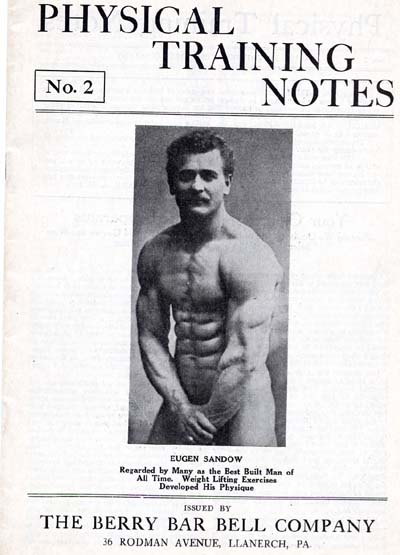How Much Work Can You Stand
by Mark H. Berry (1935)
Let’s get down to the case in point without any preamble of extraneous ado. This particular question has been the subject of much debate and discussion; it has been the topic of conversation at many gatherings and get-togethers of weight lifters and body culturists. I constantly receive letters requesting my opinion in the matter.
The question becomes all the more difficult to handle because it is so hard to get those who are interested to differentiate between average fellows and strength champions. This is the first point you must bear in mind when seeking an intelligent answer.
Novices and instructors alike seem to reason that because one or more of the strongest men in the world can endure and thrive upon an extreme amount of work it should that such procedure is advisable for all and sundry. Any such contention is simply – ALL WET.
If you want to know why some medical and physical education authorities condemn our work, it is largely for this very reason. These learned men may be of the opinion that all barbell instructors urge the novice to tug and strain at the lifting of maximum poundages without limit or reserve; and, perhaps rightly, they may reason that a similar procedure is urged upon every culturist without any concern as to the true physical condition of the individual.
If we are personally guilty of anything in this connection we should imagine it to be that of turning more or less to the opposite extreme. In our writings and correspondence we constantly urge restraint and reserve; we endeavor to start the beginner on a program which we consider will prove in the nature of moderate exertions; and we advocate no more than three training periods per week so as to give the average fellow a chance to recuperate from his exertions.
There is no question in my mind but that the top-notchers in the strength game are capable of a great deal more work than the average barbell user. But, on the other hand, there are examples of the super-strong who prefer infrequent periods of training.
I personally believe in hard work, but there must be a limit in the case of each of us, and daily training saps up too much of my energy. This same thing has been observed to be true of many others with whom I have come in contact.
Some strong men do train daily, others four, five, and six days out of each week. Then, you will find some very good strength athletes who train spasmodically – very hard, even almost daily, for indefinite periods, to be followed by intervals of laziness and refraining from exertion.
In connection with the rise to the heights of Ronald Walker, the Englishman who bids fair to cop the world’s title, we hear of his training several days out of the week and for hours each day. However, do not lose track of the fact that Ronald Walker has been training and lifting heavy weights for years; that he has gradually built himself up; and that he has acquired a degree of physical power that is beyond reach of the average amongst us barbell men.
If the average man were to attempt to train as hard as Walker
Note please that we have said nothing about improvement being out of the question. Again we must ask the reader to differentiate; we find that too many fellows are inclined to confuse improvement with the desire to become a champion. Improvement is possible for all of us, championship caliber is not.
Another point you must bear in mind is this – the majority of us must devote some of our energy to the earning of a living, so all of the energy at our command cannot be directed into the channel of physical training. Investigation may reveal that some outstanding strong men have been otherwise unemployed. We are even under the impression of having read somewhere that Walker
We know that some fellows are thus situated, but we do not wish the reader to conclude that herein lies the secret of success in physical development and rising to greater levels of strength. We are certain that the percentage of those who have thus risen is in the minority.
The particular points I have tried to bring out are: – that the average barbell user is still in the developmental stage and has by no means reached his peak; furthermore, if you are employed at a daily occupation some of your energy must be reserved for the maintenance of efficiency on your job; also that the average fellow must not compare himself with champions and professionals.



No comments:
Post a Comment